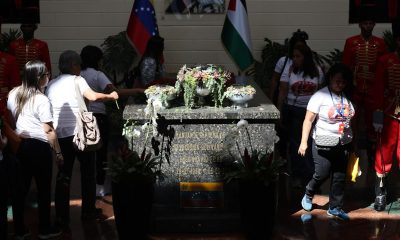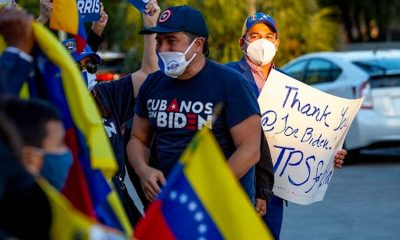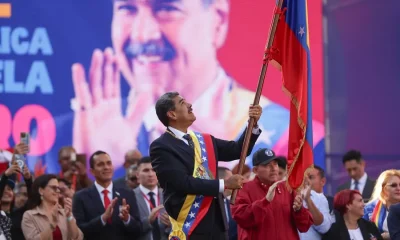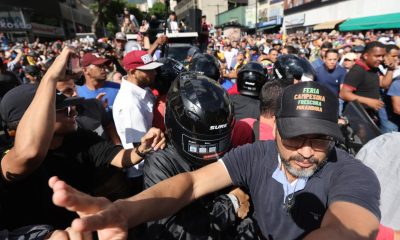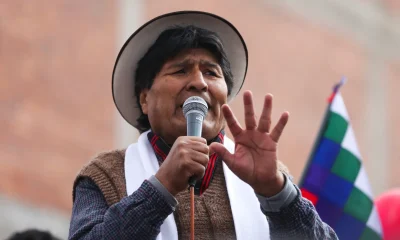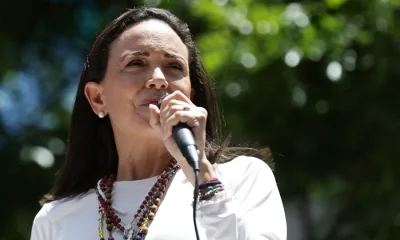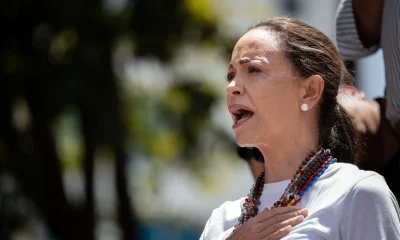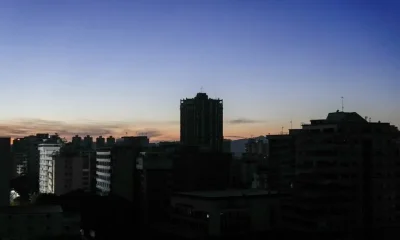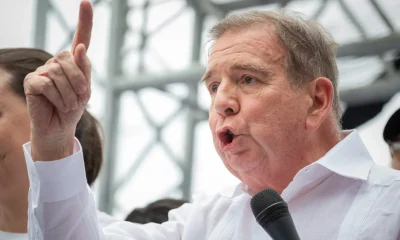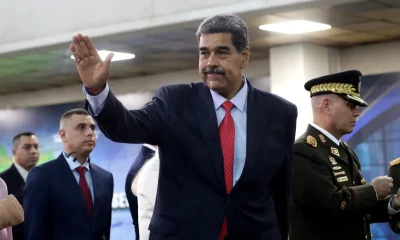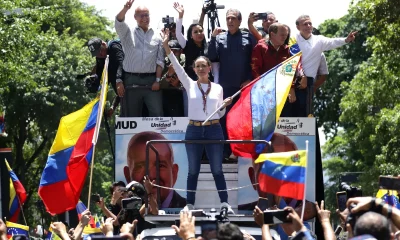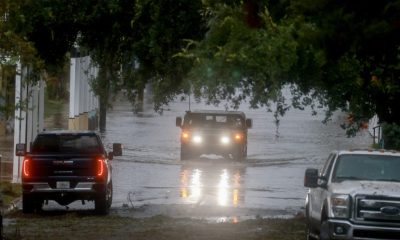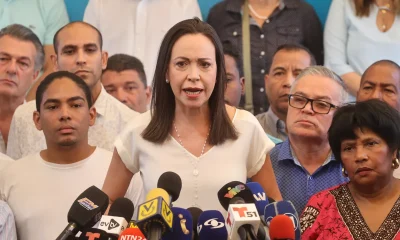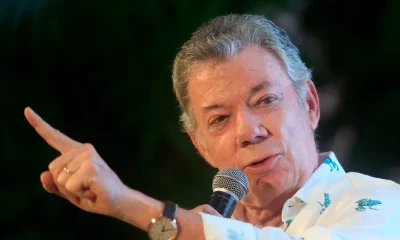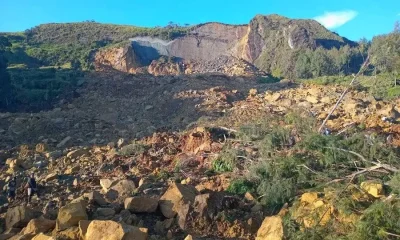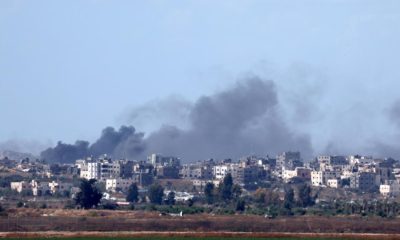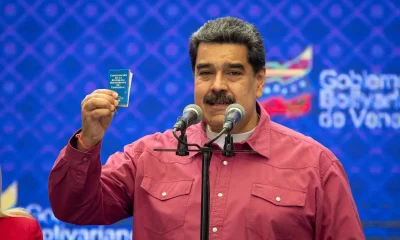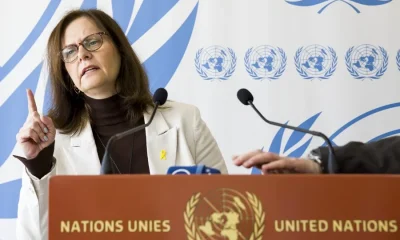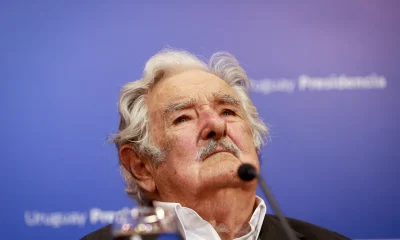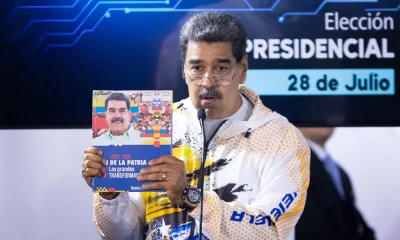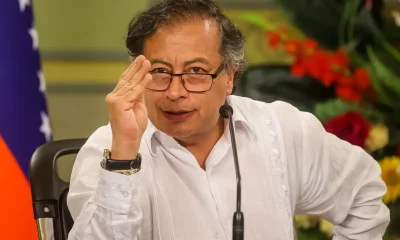International
UN mission for Venezuela: the Government is reactivating its most violent repression
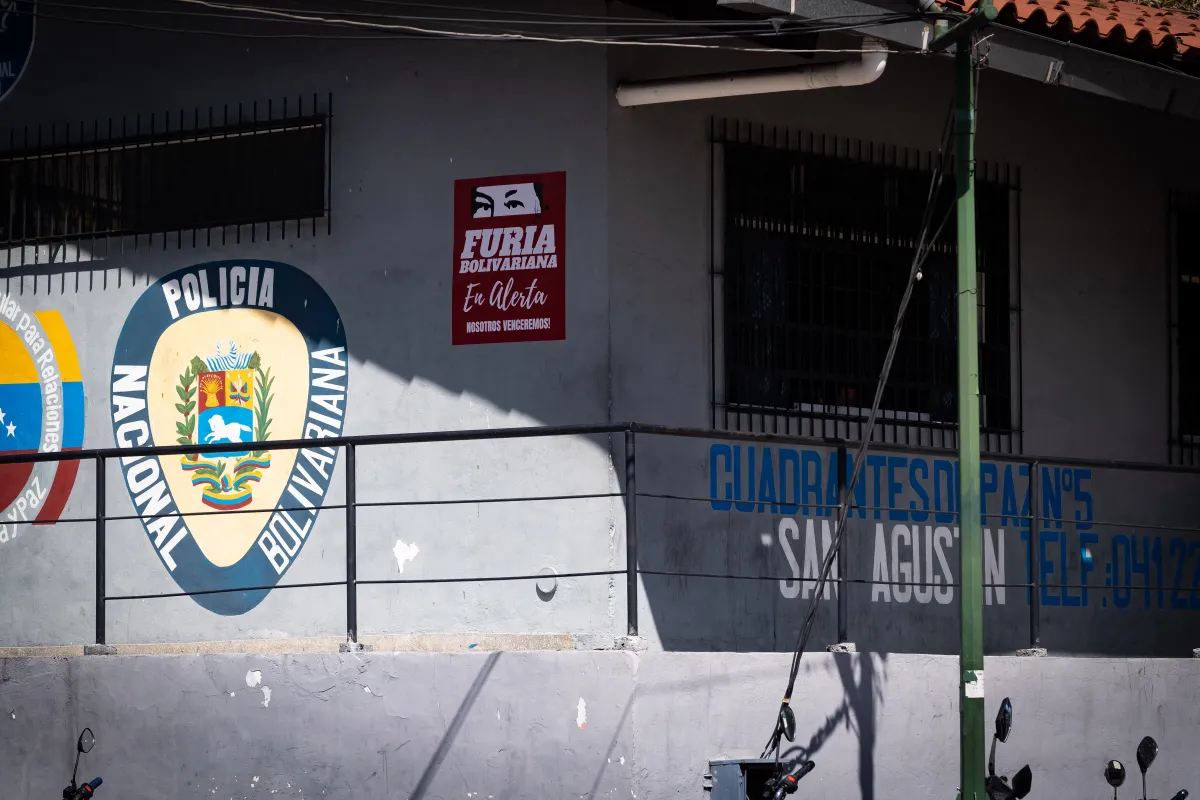
The Government of Venezuela is reactivating “the most violent form of repression,” with a new wave of arrests of opponents accused of alleged conspiracies such as the so-called Operation White Bracelet, the UN Independent International Mission for the country said on Wednesday.
The president of the mission, the Portuguese Marta Valiñas, presented to the United Nations Human Rights Council a new report on abuses committed by the Government of Nicolás Maduro in Venezuela since 2023, where she stressed that “the authorities invoke real or fictitious conspiracies to smedget, arrest and prosecute opponents or government critics.”
In this period, he said, we have moved from a less repressive phase of the opposition, in which Nicolás Maduro’s regime was limited to creating “a climate of fear and intimidation,” to a more violent period “that is activated to silence the voices of the opposition at any price.”
Valiñas highlighted in this sense that in January 2024 Maduro asked to “activate the Bolivarian Fury” after assuring that the previous year four conspiracies had been deactivated to assassinate him or organize coups d’état, and that the Attorney General’s Office then announced the aforementioned Operation White Bracelet, one of the alleged plots to end the life of the Venezuelan president.
In the context of the fight against this last conspiracy, 33 soldiers were degraded and expelled and different critics of the regime were arrested.
Among them, he recalled, campaign leaders of the Vente Venezuela party (the formation of the opposition leader María Corina Machado) and human rights defenders such as Tamara Suju, Sebastiana Barráez or the Spanish-Venezuelan Rocío San Miguel.
Valiñas stressed that San Miguel, arrested on February 9 at Maiquetía airport without a court order, was in unknown whereabouts for five days “until the authorities reported that she was detained in El Helicoide, one of the torture centers documented by the mission.”
He also stressed that that month, shortly after both the mission he presides over and the UN Office for Human Rights expressed their concern for San Miguel, the Venezuelan Government suspended the activities of the technical mission of the aforementioned office and gave its staff a period of 72 hours to leave the country.
The head of the mission completed by the Chilean Francisco Cox and the Argentine Patricia Tappatá added that together with San Miguel they have documented cases of 18 other women who remain detained under the accusation of being associated or involved in “conspiracies” to overthrow the Government.
Valiñas also recalled that in the six months analyzed by the mission, an agreement between the Government and the opposition was signed in Barbados so that it could participate in the elections of July 28 of this year, but subsequent actions highlighted the difficulties for its implementation.
The president of the mission gave as an example the suspension by the Supreme Court of Justice of the opposition primaries of October 22, won by a large majority by María Corina Machado, and the ratification by the same instance of justice of her 15-year political disqualification of 15 years, on January 26.
“These actions highlight the serious difficulties that exist in ensuring that the next presidential elections are carried out in accordance with the right to participate in public affairs provided for in the International Covenant on Civil and Political Rights,” Valiñas stressed.
It also drew attention to the arrest warrants against 14 people, including prominent opposition leaders such as Juan Guaidó and Leopoldo López, for their alleged connection with a conspiracy against the consultative referendum on Guayana Esequiba, held on December 3.
In the turn of reply, Venezuela’s delegation to the UN Human Rights Council in Geneva once again rejected the conclusions of the mission and even its legitimacy, created in 2019 by the council itself to investigate human rights abuses in the country.
“The United States, the greatest violator of rights in all history, the European Union and the failed Lima Group designed this mechanism (the mission) with the purpose of applying maximum pressure on Venezuela, manipulating the instruments and purposes of this Council,” said a representative of the delegation.
“They pretend to cover as absolute truths all the barbarities fabricated against Venezuela without verification or sustainable proof,” he added, alluding to the work of a mission that in his opinion “appeals to anonymous and even invented sources.”
International
U.S. Senate Rejects Budget, Bringing Government Closer to Shutdown Amid DHS Dispute

The U.S. Senate voted on Thursday against a budget proposal in a move aimed at pressuring changes at the Department of Homeland Security (DHS), following the killing of two civilians during a deployment of immigration agents in Minneapolis.
All Senate Democrats and seven Republican lawmakers voted against the bill, which requires 60 votes to advance, pushing the country closer to a partial government shutdown that would cut funding for several agencies, including the Pentagon and the Department of Health.
The rejection came as Senate leaders and the White House continue negotiations on a separate funding package for DHS that would allow reforms to the agency. Proposed measures include banning Immigration and Customs Enforcement (ICE) agents from wearing face coverings and requiring them to use body-worn cameras during operations.
The vote took place just hours after President Donald Trump said he was “close” to reaching an agreement with Democrats and did not believe the federal government would face another shutdown, following last year’s record stoppage.
“I don’t think the Democrats want a shutdown either, so we’ll work in a bipartisan way to avoid it. Hopefully, there will be no government shutdown. We’re working on that right now,” Trump said during a Cabinet meeting at the White House.
International
Trump Says Putin Agreed to One-Week Halt in Attacks on Ukraine Amid Extreme Cold

U.S. President Donald Trump said on Thursday that he secured a commitment from Russian President Vladimir Putinto halt attacks against Ukraine for one week, citing extreme weather conditions affecting the region.
“Because of the extreme cold (…) I personally asked Putin not to attack Kyiv or other cities and towns for a week. And he agreed. He was very pleasant,” Trump said during a Cabinet meeting broadcast by the White House.
Trump acknowledged that several advisers had questioned the decision to make the call.
“A lot of people told me not to waste the call because they wouldn’t agree. And he accepted. And we’re very happy they did, because they don’t need missiles hitting their towns and cities,” the president said.
According to Trump, Ukrainian authorities reacted with surprise to the announcement but welcomed the possibility of a temporary ceasefire.
“It’s extraordinarily cold, record cold (…) They say they’ve never experienced cold like this,” he added.
Ukrainian President Volodymyr Zelensky later commented on the announcement, expressing hope that the agreement would be honored.
International
Storm Kristin Kills Five in Portugal, Leaves Nearly 500,000 Without Power

Storm Kristin, which battered Portugal with heavy rain and strong winds early Wednesday, has left at least five people dead, while nearly half a million residents remained without electricity as of Thursday, according to updated figures from authorities.
The revised death toll was confirmed to AFP by a spokesperson for the National Emergency and Civil Protection Authority (ANPEC). On Wednesday, the agency had reported four fatalities.
Meanwhile, E-Redes, the country’s electricity distribution network operator, said that around 450,000 customers were still without power, particularly in central Portugal.
Emergency services responded to approximately 1,500 incidents between midnight and 8:00 a.m. local time on Wednesday, as the storm caused widespread disruptions.
The Portuguese government described Kristin as an “extreme weather event” that inflicted significant damage across several regions of the country. At the height of the storm, as many as 850,000 households and institutions lost electricity during the early hours of Wednesday.
Several municipalities ordered the closure of schools, many of which remained shut on Thursday due to ongoing adverse conditions.
Ricardo Costa, regional deputy commander of the Leiria Fire Brigade, said residents continue to seek assistance as rainfall persists.
“Even though the rain is not extremely intense, it is causing extensive damage to homes,” he noted.
In Figueira da Foz, a coastal city in central Portugal, strong winds toppled a giant Ferris wheel, underscoring the severity of the storm.
-

 Central America4 days ago
Central America4 days agoGuatemala seizes over a ton of cocaine hidden in flour at Pacific port
-

 Central America3 days ago
Central America3 days agoGuatemala Police Arrest Prison Guard Caught in the Act of Extortion
-

 Central America3 days ago
Central America3 days agoHonduras swears in conservative president Asfura after disputed election
-

 International4 days ago
International4 days agoHistoric snowstorm paralyzes Toronto after 60 centimeters of snow
-

 Central America3 days ago
Central America3 days agoBukele leads public trust rankings as UCA survey highlights gains in security
-

 International2 days ago
International2 days agoFootball Fan Killed in Clashes After Colombian League Match
-

 International4 days ago
International4 days agoSpain’s irregular migrant population rises to 840,000, study finds
-

 Central America2 days ago
Central America2 days agoGuatemala President Says Starlink Terminal Found Inside Prison
-

 International3 days ago
International3 days agoDoomsday clock moves to 85 seconds before midnight amid rising global risks
-

 International3 days ago
International3 days agoWinter Storm Fern Leaves 30 Dead and Over One Million Without Power Across the U.S.
-

 Sin categoría3 days ago
Sin categoría3 days agoEight Killed in Series of Armed Attacks in Ecuador’s Manabí Province
-

 International3 days ago
International3 days agoSpain approves plan to regularize up to 500,000 migrants in Historic Shift
-

 International1 day ago
International1 day agoU.S. Senate Rejects Budget, Bringing Government Closer to Shutdown Amid DHS Dispute
-

 International4 days ago
International4 days agoRights group says nearly 6,000 killed in Iran protest crackdown
-

 Sin categoría3 days ago
Sin categoría3 days agoEl Salvador Launches Fourth Year of Ocean Mission to Protect Marine Ecosystems
-

 International2 days ago
International2 days agoMissing Spanish Sailor Rescued After 11 Days Adrift in Mediterranean
-

 International2 days ago
International2 days agoRubio Says U.S. Could Participate in Follow-Up Russia-Ukraine Talks
-

 Central America7 hours ago
Central America7 hours agoPanama Supreme Court Strikes Down Panama Ports Concession as Unconstitutional
-

 International4 days ago
International4 days agoVenezuela frees at least 80 political prisoners, NGO says
-

 International4 days ago
International4 days agoEU launches new probe into X over AI-generated fake nude images
-

 International1 day ago
International1 day agoStorm Kristin Kills Five in Portugal, Leaves Nearly 500,000 Without Power
-

 International1 day ago
International1 day agoTrump Says Putin Agreed to One-Week Halt in Attacks on Ukraine Amid Extreme Cold
-

 Central America7 hours ago
Central America7 hours agoU.S. and Guatemala Sign Trade Deal Granting Zero Tariffs to Most Exports
-

 International4 days ago
International4 days agoFrance debates ban on social media for children under 15
-

 International1 day ago
International1 day agoMan Arrested After Vehicle Crashes Into Jewish Institution in Brooklyn
-

 International4 days ago
International4 days agoSevere winter storm grips U.S., leaves multiple dead as extreme cold persists





























